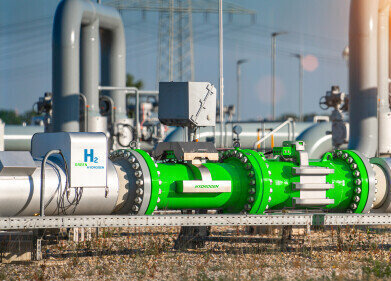Sustainable aviation fuel (SAF)
How Far Away is Synthetic Fuel?
Dec 01 2022
There’s plenty of buzz surrounding EVs. But what about synthetic fuels? Cost effective and ecofriendly, many analysts predict synthetic fuels could be the solution to dwindling supplies of natural resources, as well as global issues like air pollution, global warming and soaring fuel prices.
Synthetic fuels could also offer a lifeline to combustion engine cars, which are set to be banned in the UK in 2030. The EU plans to follow suit and veto sales of new petrol and diesel powered cars by 2035. This is where synthetic fuels come in. Unlike electric motors, synthetic fuels are a drop-in replacement for fossil fuels. And unlike fossil fuels, they don’t have an alarming environmental footprint. Lobby groups across the continent maintain synthetic fuels can keep combustion vehicles on European roads, without the environmental footprint.
A new generation of climate neutral fuel
There are exciting developments unfolding in the synthetic fuels arena. Italian supercar manufacturer De Tomaso recently made headlines for getting its dizzyingly powerful P900 V12 engine to spin at speeds of more than 12,000 rpm using synthetic fuel. For De Tomaso CEO Norman Choi, it’s an exhilarating milestone for the fight to save the combustion engine.
“As a passionate automotive enthusiast, it is difficult for me to accept a silent EV-driven future,” says Choi. “We believe that alternatives do exist, and the development of our new platform, driven by synthetic fuels, is our solution for keeping this shared passion for the theatre of combustion engines alive.”
So, how far away is synthetic fuel from becoming the norm at forecourts?
Critics label synthetic fuels a “Trojan Horse”
While synthetic fuel technologies have big potential, there’s a lot of ground to cover before they step up as a replacement for fossil-derived fuels. New data from EU-based campaign group Transport & Environment (T&E) reveals current synthetic fuel supplies will power just 2% of cars on European roads. This is largely because synthetic fuel technology is still in its infancy. Manufacturers haven’t yet scaled up production and as a result, can’t meet demand for the 287 million cars that will be on European roads by 2035.
T&E lobbyists say synthetic fuels are a “Trojan Horse” and warn oil companies, engine manufacturers and auto giants will attempt to heavily market the technology in a bid to delay the transition to zero carbon roads.
“E-fuels are presented as a carbon-neutral way to prolong the life of combustion engine technology,” says Yoann Gimbert, an analyst at T&E. “But the industry’s own data shows there will only be enough for a tiny fraction of cars on the road. Lawmakers should close the door to this Trojan Horse for the fossil fuel industry.”
The transport industry isn’t the sole offender when it comes to greenhouse gas emissions. Food waste also has a role to play. Find out more about the issue in ‘The Effects of Food Loss and Waste (FLW) on Green House Gas (GHG) Emissions.'
Digital Edition
PIN 26.1 Feb/Mar 2025
March 2025
Analytical Instrumentation - Elemental Analysis for Quality and Process Control at Refineries, for Lubricants and Wear Metals in Engine Oils - Synthetic Lubricants: New Developments - Scaling...
View all digital editions
Events
Apr 02 2025 Saigon, Vietnam
Apr 02 2025 Atyrau, Kazakhstan
Apr 08 2025 Birmingham, UK
Apr 08 2025 Kielce, Poland
Apr 08 2025 Ravenna, Italy



















